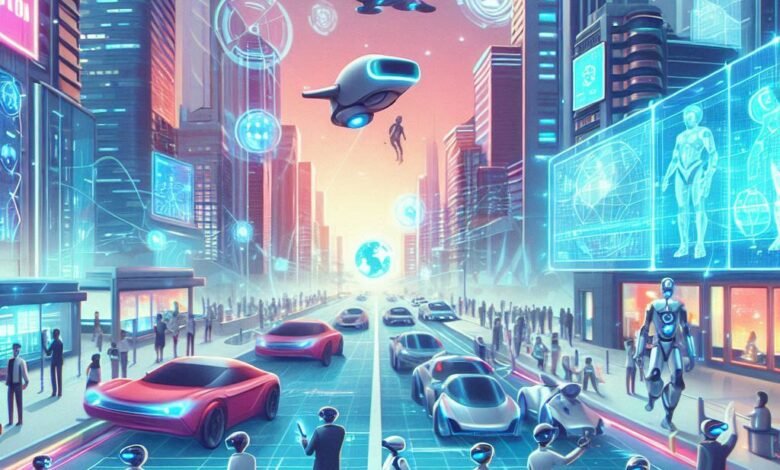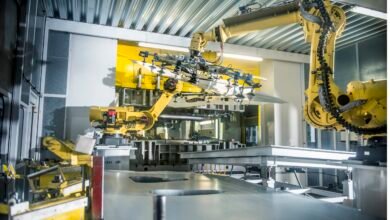Top 15 Technology Trends in 2025
From AI-driven insights to advanced IoT ecosystems and sustainable tech, these innovations will respond to pressing demands for efficiency, real-time data, and environmentally responsible solutions.

In 2025, technology trends are set to transform industries, society, and daily life, with innovations in artificial intelligence (AI), quantum computing, and the Internet of Things (IoT) leading the way. AI and machine learning will continue advancing, driving smarter automation, enhanced predictive analytics, and intelligent customer experiences. Meanwhile, with the global adoption of 5G complete, 6G research will push connectivity to new heights, unlocking the potential for real-time virtual reality (VR) applications and expanding IoT infrastructure for smart cities and industrial automation. Quantum computing is also expected to see breakthroughs, opening doors for solving complex challenges in areas like cryptography and pharmaceuticals.
Other emerging trends, such as edge computing, blockchain technology, and cybersecurity advancements, will be crucial for managing and securing vast amounts of data generated by these technologies. Furthermore, sustainability will be embedded in innovations across industries, from renewable energy solutions to green tech in agriculture and construction. As these trends converge, 2025 promises to be a transformative year for technology, offering both opportunities and new standards for a tech-driven future. Here are the top 15 technology trends expected to shape industries and society in 2025:
1. Artificial Intelligence and Machine Learning Advancements
AI and ML will continue to drive transformation across industries, with developments in natural language processing (NLP), generative AI, and machine vision. AI models are expected to become more sophisticated, efficient, and accessible, allowing companies to harness predictive analytics, automate decision-making, and enhance customer experiences.
2. 5G Expansion and the Rise of 6G
The global rollout of 5G will be largely complete by 2025, enabling faster data transfer, low latency, and expanded IoT capabilities. At the same time, early developments in 6G technology will begin, promising unprecedented speeds and improved connectivity, crucial for supporting high-data applications like real-time VR and smart cities.
3. Internet of Things (IoT) and Smart Ecosystems
IoT will become an integral part of daily life as devices become smarter and more interconnected. IoT ecosystems will expand in areas like healthcare, agriculture, and urban infrastructure, creating smart cities, precision farming, and personalized healthcare applications. IoT security and data management solutions will also rise in importance to handle the vast amounts of data generated.
4. Edge Computing and Real-Time Data Processing
Edge computing will gain traction as more devices and sensors collect data in real time. This trend will reduce latency and bandwidth usage by processing data closer to the source, which is critical for applications such as autonomous vehicles, industrial automation, and remote healthcare monitoring.
5. Quantum Computing Progress
Although still in the developmental stage, quantum computing is expected to make breakthroughs by 2025, particularly in areas like cryptography, complex modeling, and drug discovery. Tech giants and research institutions are investing heavily in this field, aiming to solve problems beyond the reach of classical computers.
6. Biotechnology and Genetic Engineering
Advances in biotechnology, especially in CRISPR and gene editing, will offer solutions in healthcare and agriculture. Personalized medicine, gene therapies, and even genetically modified organisms for increased crop yield are expected to grow, addressing pressing issues like food security and genetic disorders.
7. Blockchain Evolution and Decentralized Applications (DApps)
Beyond cryptocurrencies, blockchain technology will be used in supply chain management, voting systems, and secure data transfer. Decentralized applications (DApps) will grow in popularity, offering users more control over data and transactions in industries such as finance, healthcare, and governance.
8. Cybersecurity Innovations and Privacy-Enhancing Technologies
As cyber threats become more sophisticated, cybersecurity will remain a top priority. Privacy-enhancing technologies, such as homomorphic encryption and secure multi-party computation, will help protect sensitive data. AI-based cybersecurity tools will also play a significant role in identifying and mitigating threats in real time.
9. Augmented Reality (AR) and Virtual Reality (VR) Expansion
AR and VR technologies will become more immersive and accessible, with applications beyond entertainment. Sectors such as education, healthcare, and remote work will adopt these technologies for training, therapy, and collaboration. Mixed reality, which combines AR and VR, will also make experiences more interactive.
10. Sustainable and Green Technologies
The push for sustainability will lead to the rise of green tech solutions, including renewable energy sources, carbon capture, and energy-efficient infrastructure. Sustainable tech will be integrated into industries like construction, agriculture, and transportation, reducing environmental impact and promoting resource efficiency.
11. Robotic Process Automation (RPA) and Hyperautomation
Hyperautomation, which combines RPA with AI, ML, and other tools, will transform businesses by automating repetitive tasks, optimizing workflows, and reducing operational costs. Industries from finance to manufacturing will rely on hyperautomation to improve efficiency and respond to market demands faster.
12. Digital Twins for Simulation and Optimization
Digital twins, virtual replicas of physical assets or systems, will become essential for optimizing processes, predicting maintenance, and simulating real-world conditions. They will be used extensively in sectors like manufacturing, construction, and healthcare to enhance productivity and reduce risks.
13. Voice and Conversational AI
Voice technology and conversational AI will improve customer experiences by allowing more intuitive interaction with devices. Smart assistants, chatbots, and voice-activated devices will become more human-like, facilitating seamless communication between users and technology in areas like customer service, healthcare, and home automation.
14. Personalized and Predictive Healthcare
Advances in AI, genomics, and wearable technology will enable personalized healthcare solutions. Predictive healthcare, which uses data analytics to anticipate medical conditions, will reduce hospital visits, support preventive care, and improve overall patient outcomes. Remote health monitoring and telemedicine will also expand.
15. Metaverse Development and Digital Ownership
The concept of the metaverse, a virtual world combining AR, VR, and the internet, will take shape by 2025, providing immersive experiences in entertainment, work, and social interactions. Digital ownership, enabled by blockchain, will allow users to own and trade virtual assets, creating new business opportunities in this growing digital economy.
These trends in technology are set to reshape industries, enhance human experiences, and drive innovation across multiple fields by 2025, offering both challenges and opportunities for businesses, consumers, and governments.
Conclusion
In conclusion, the technology trends of 2025 are poised to meet evolving needs in connectivity, automation, security, and sustainability, fundamentally shaping the way we live and work. From AI-driven insights to advanced IoT ecosystems and sustainable tech, these innovations will respond to pressing demands for efficiency, real-time data, and environmentally responsible solutions. As we embrace 5G and edge computing, technology will be more accessible and powerful, enabling industries to scale and individuals to interact with the digital world more seamlessly. The integration of these trends will not only address current challenges but also create a resilient and adaptive foundation for future growth. By staying informed and adaptable, we can leverage these technologies to enhance productivity, improve quality of life, and build a sustainable, connected world that meets the complex needs of the next generation.








One Comment